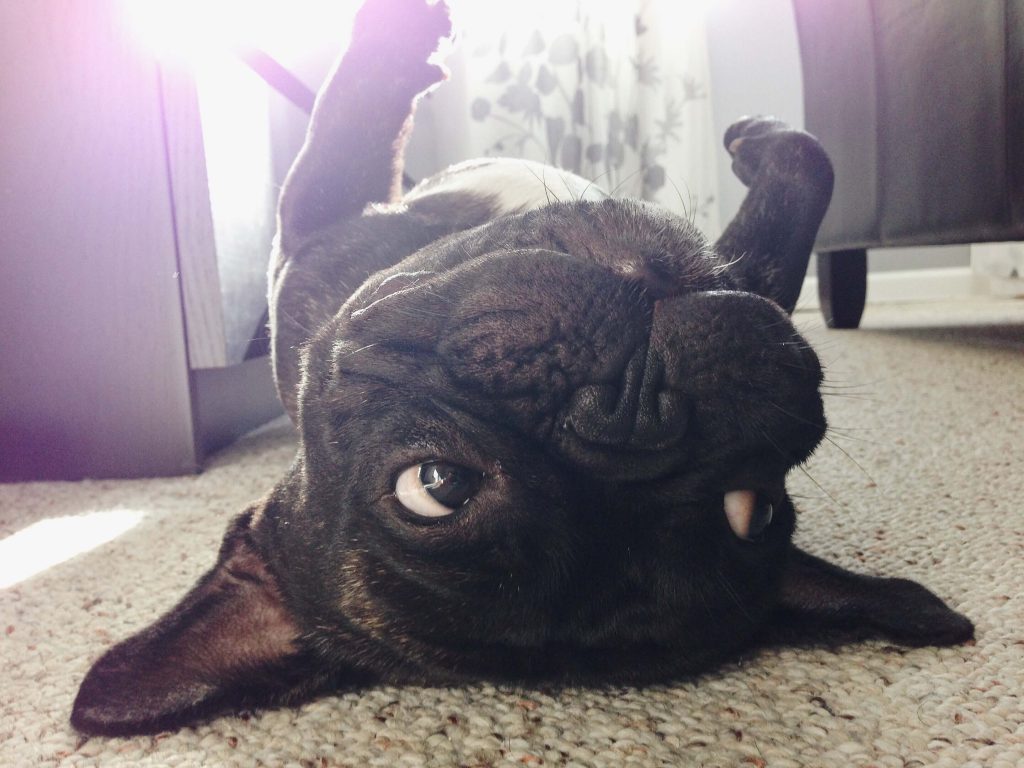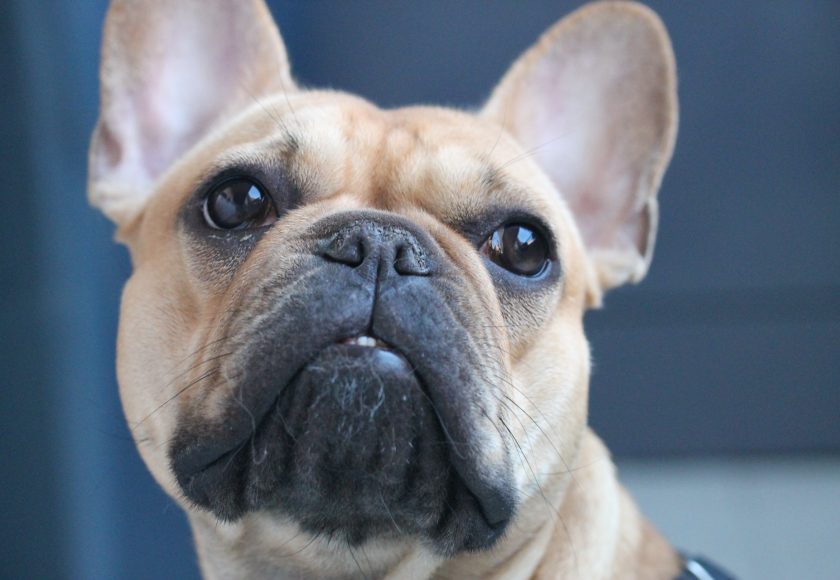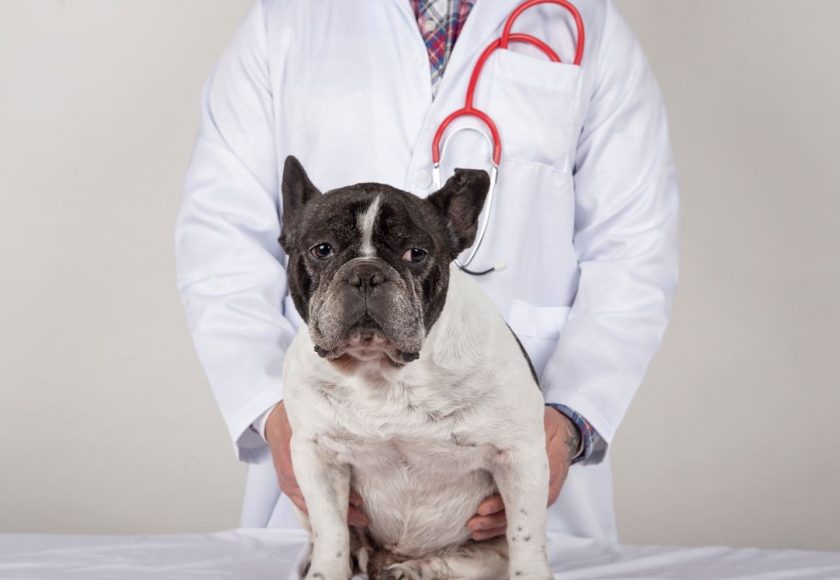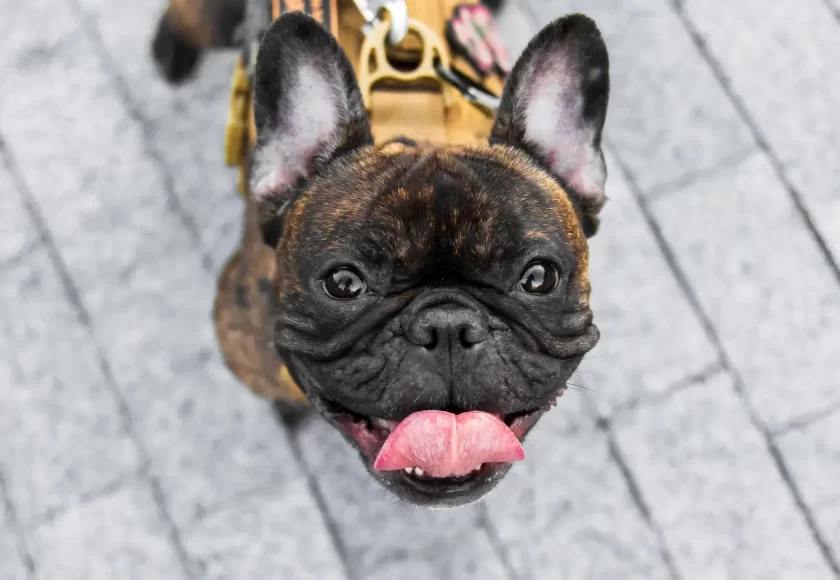
Most Frenchie owners enjoy their puppy licking their face when they cuddle. You know the deal:
Hugs without kisses are not as sweet and heartwarming.
The only problem may be your pup’s bad breath. It can be such a mood spoiler!
So, the question is:
How to deal with French bulldog bad breath?
We’ll help!
We’ll list all the possible causes of bad breath in dogs – and give you advice on how to treat it – so that you can enjoy bonding with your Frenchie worry-free!
Why Do Frenchies Have A Bad Breath?

In general, dogs have bad breath because something is wrong inside their bodies – meaning it’s commonly a sign of some underlying condition.
What are the most common causes of canine bad breath?
Here are a few examples:
- Poor or inadequate diet
- Poor dental health
- Blocked anal glands
- Something that your dog has picked up outside
How can you determine which problem is bothering your French bulldog?
Don’t worry; we’ll go through every possible cause in detail.
Let’s start from the end for a change:
If your Frenchie has been outside, the chances are that they were exploring the surroundings. The problem is that dogs explore everything with their noses and mouths – especially puppies.
So, your Frenchie might have accidentally sniffed or even licked some poop or pee. Gross, we know! Even if it was “only” some trash or food waste, the scent could linger for quite a while.
It might be the cause of that unpleasant odor coming from your dog’s mouth.
Moreover, this can be the reason why your French bulldog is stinky in general. Your pup might have stepped into something foul.
That’s why it’s best always to check your little furry buddy when you come home from the daily walk or outdoor playtime.
You don’t want your Frenchie covered in some smelly mess. After all, you know how dogs bathe themselves. And if you do not clean your pooch, they will lick everything off – and the gross will just get a whole lot grosser.
Speaking of gross, let’s tackle those anal glands mentioned earlier.
If your French Bulldog’s anal glands are blocked, their breath can become very stinky. How?
Well, your Frenchie has a thing for licking its tush.
Yeah, we know it’s super-gross – but all dogs do it. They do it even more often when their anal glands are blocked because that helps them relieve the pain and discomfort.
The whole “We are what we eat” concept also applies to dogs.
Do not worry; your Frenchie will not morph into a kibble – but it will smell like garbage if fed with garbage. No, that’s not a bad pun:
Your Frenchie can sometimes eat literal garbage if you’re not careful – but that’s not what we have in mind here. We’re referring to a poor diet packed with dog food high in fat and protein.
This dog version of junk food can give your pup that smelly breath you despise.
How can you help?
Make your dog happy inside out!
Feed your beloved Frenchie with high-quality, well-balanced dog food. Consult a vet – or a dog nutritionist – if you’re not sure what to choose.
Proper diet and enough exercise not only improve your dog’s smell but their overall health, as well.
Finally – and we dare to say most commonly – the reason behind your Frenchie’s bad breath is poor dental hygiene.
If you don’t brush your teeth regularly, tartar and plaque will build up. The same happens to our canine friends.
The solution is easy and quite obvious – good toothbrushing! Alternatively – or additionally – you can give your Frenchie some specially designed chew toys that are meant for enhancing canine dental hygiene.
Once your pup’s mouth is all clean and healthy, the bad breath will disappear, and you can kiss them as much as you like. We bet you can’t wait!
Identifying The Smell
Bad breath can point to some underlying condition, as well. Identifying the smell might help you discover what caused it in the first place.
Here are some of the most common “fragrances” you may encounter:
Fish
There are a few possible causes of fishy breath in dogs. Of course, the most obvious is too much fish (or fish oil) in your Frenchie’s diet.
The fish scent is characteristic of Frenchies that have blocked anal glands, too. We are not sure why that happens, but if eliminating fish and fish oil does not resolve the problem, you should have the vet check those pesky glands.
Metal
If your French bulldog’s breath smells like metal, you probably feed them too much meat and protein. So, when your dog smells like iron – some even define this smell as a smell of blood – cut down on meat and see if that helps.
Sugar Or Fruit
Even though a sweet sugary breath might not bother you, that doesn’t mean it’s a good thing. Quite the opposite – a sweet sugar smell can be a sign of diabetes.
Dogs that suffer from diabetes can’t process insulin and sugars. As a result, undigested ketones come out in their breath.
Therefore, if you notice an almost pleasant sweet or fruity smell in your French bulldog’s breath, go to your vet as soon as possible.
Assessing The Strength Of The Smell
Strength is as important as the fragrance.
A mild scent usually isn’t a reason for concern; it’s probably something in passing or something your dog has picked up outside.
Also, take note of how long the smell lingers.
If it lasts too long, first explore your pooch’s diet to ensure there isn’t anything wrong with it.
If the bad breath is so intense and persistent that you can’t get rid of it regardless of the change in their hygiene and diet, visit the vet. The sooner you identify the problem, the sooner you’ll be able to solve it.
How To Prevent Bad Breath In Your French Bulldog?
Since we helped you become a “bad breath connoisseur,” we might as well teach you how to solve the smelly problem once and for all.
It goes without saying that your expertise will be limited to problems with your Frenchie’s poor hygiene and/or diet. The professionals must still address any medical concerns.
So, unless you have a diploma that says you’re a doctor of veterinary medicine, you should best leave everything to them.
Proper Dental Hygiene
There are several ways to keep your Frenchie’s teeth plaque-free and fresh smelling. We recommend using:
- A finger dog toothbrush and a special kind of dog toothpaste called enzymatic toothpaste (it’s best to use toothpaste daily – or a minimum of once a week)
- Dog food formulations and treats designed to help reduce plaque and tartar and improve overall dental health
- Dental chew toys designed for gnawing, crunching, and removing plaque and dirt from between your dog’s teeth and the areas that you have trouble reaching with a toothbrush
Proper Diet
We’ve already advised you to feed your Frenchie with high-quality dog food only.
It doesn’t matter whether it’s wet or dry; it needs to provide your pup with proper amounts of nutrients and minerals. Natural-based or organic dog food is the best choice you can make in that sense.
A balanced diet can also prevent the highly-unpleasant problem with the anal glands. If your Frenchie has enough fiber in their diet, there should be no issues with their tush.
On the other hand, your French bulldog’s poop becomes watery and loose when there’s a fiber shortage. And if this persists, your pooch might end up with blocked glands.
In short, diet matters – in more ways than one.
Proper Hydration
Did you ever notice how your breath smells funny when you are thirsty? It happens to dogs, too.
Therefore, make sure your dog always has access to fresh, clean water. Maybe the problem is that your pup’s dehydrated.
Exercise
A lack of physical activity can lead to blocked glands, as well. For this reason – and many others – make sure your Frenchie is in tip-top shape and gets plenty of exercise every day.
Regular Vet Checkups
Visit your vet regularly.
Professional advice can help you avoid many issues, including bad breath. Moreover, only vets are qualified to treat severe conditions that might be causing the bad smell in your dog’s mouth – one of which is diabetes.




